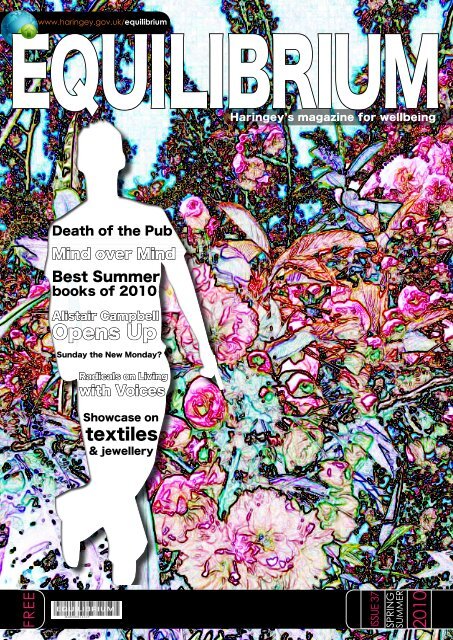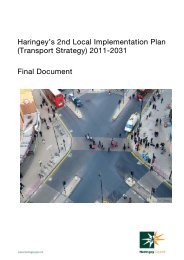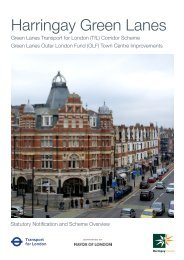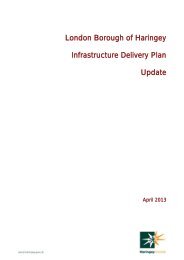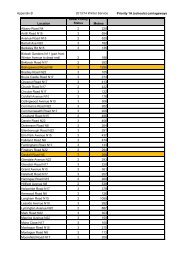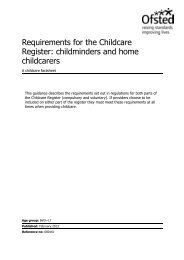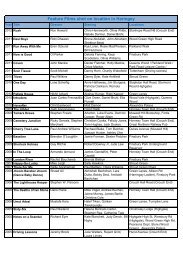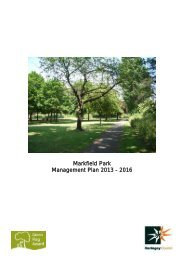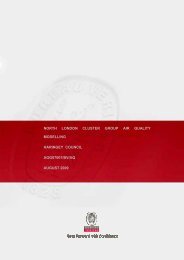Equilibrium Magazine Issue 37
Equilibrium Magazine Issue 37
Equilibrium Magazine Issue 37
Create successful ePaper yourself
Turn your PDF publications into a flip-book with our unique Google optimized e-Paper software.
www.haringey.gov.uk/equilibrium<br />
EQUILIBRIUM<br />
Haringey’s magazine for wellbeing<br />
Death of the Pub<br />
Mind over Mind<br />
Best Summer<br />
books of 2010<br />
Alistair Campbell<br />
Opens Up<br />
Sunday the New Monday?<br />
Radicals on Living<br />
with Voices<br />
Showcase on<br />
textiles<br />
& jewellery<br />
FREE<br />
ISSUE <strong>37</strong><br />
SPRING<br />
SUMMER<br />
2010
Patron:<br />
Dr Liz Miller<br />
(Mind Champion 2008)<br />
We are now on the web!<br />
www.haringey.gov.uk/equilibrium<br />
Coming up in <strong>Issue</strong> 38:<br />
q Angela on the evolution of <strong>Equilibrium</strong>:<br />
looking back to the beginning<br />
q Wellbeing Day at Canning Crescent<br />
q Include: Film and Culture Day at the Clarendon.<br />
q Ritalin expose<br />
q Personality Plus event at the National Portrait Gallery<br />
Web alerts:<br />
Please email us at:<br />
equilibriumteam@hotmail.co.uk if you<br />
would like an alert each time our<br />
magazine is published on the web:<br />
(www.haringey.gov.uk/equilibrium).<br />
<strong>Equilibrium</strong> is devised, created, and produced entirely by team<br />
members with experience of the mental health system.<br />
Photo copyright remains with all individual artists and <strong>Equilibrium</strong>.<br />
All rights reserved. 2010<br />
Design: www.parkegraphics.co.uk<br />
Front cover:<br />
original image (see left): Ian Stewart<br />
digital rework: Anthony Parke<br />
EQUILIBRIUM 2
Contents<br />
4 -5 Ceramic signs at the<br />
Clarendon Centre made by<br />
ervice users; Bulletin<br />
6-7 Book Corner; Screen Printing<br />
and Mental Health First Aid.<br />
8-9 New Beginnings<br />
Conference Liverpool and Alistair<br />
Campbell Un-spun.<br />
10-11 Streetwise Opera and web<br />
cast.<br />
12-13 On Reflection and<br />
Creative Writing<br />
14-15 The Open University<br />
experience, online therapy, and<br />
News and review.<br />
16-17 Oiling the Brain; the Omega<br />
3 Connection and Living with<br />
Voices; stories of Recovery. Glad<br />
to be mad and Meet n’ Eat.<br />
18-19 User network Launch,<br />
Disorder at the Tate, and<br />
Opinions<br />
editorial<br />
This spring summer edition of <strong>Equilibrium</strong> is all about new<br />
beginnings. As the flowers come out for summer England<br />
has welcomed into power a new coalition government<br />
under David Cameron and Nick Clegg. What the future<br />
holds is unclear but what we do know is that change has<br />
happened.<br />
Change was also the theme at the New Beginnings<br />
Conference in Liverpool. <strong>Equilibrium</strong> was there to report.<br />
The issue has a wealth of topics from conferences to<br />
nouvelle vague looks into all aspects of mental well being<br />
as well as developments in the Mental Health area; how<br />
people are dealing with life in general along with some<br />
breakthrough stories and reviews of recent mental health<br />
literature and issues.<br />
contributions<br />
Wanted: contributions to <strong>Equilibrium</strong>! Please email us with<br />
your news, views, poems, photos, plus articles. Anonymity<br />
guaranteed if required.<br />
contact us<br />
<strong>Equilibrium</strong>, Clarendon Centre, Clarendon Road, London, N8<br />
ODJ. 02084894860, equilibriumteam@hotmail.co.uk. We are<br />
in the office on Wednesday mornings 9.45-11.45, but you can<br />
leave a message at other times and we’ll get back to you.<br />
the team<br />
Facilitator: Polly Mortimer. Editorial team: Pumla Kisosonkole,<br />
Angela, Siham Beleh, Ian Stewart, James Spear, Tracy dos<br />
Santos, Michael O’Connell. Graphic design: Anthony Parké,<br />
Editorial coordinator: Ruben Wilberg. The views expressed<br />
in <strong>Equilibrium</strong> are those of the individual authors and do not<br />
necessarily reflect the opinions of the editorial team.<br />
advertisement<br />
If you wish to advertise in <strong>Equilibrium</strong> email us using the<br />
contact details above.<br />
EQUILIBRIUM 3
&<br />
Textiles Jewellery<br />
Brightening up a corner<br />
of reception at the<br />
Clarendon centre is a<br />
cabinet displaying some<br />
of the very professional<br />
looking work the textile<br />
group have been doing.<br />
Sharon Williams - who runs<br />
the group - explained that<br />
the brightly coloured<br />
cushion was made by<br />
Chan and the hen - which<br />
is a doorstop - and is<br />
called ‘Dorothy’ was<br />
made by Nora. (It was<br />
filled with sand to give it<br />
weight). Other examples<br />
by different members are<br />
on show too and took 2/3<br />
weeks to complete. An<br />
interesting group -<br />
especially for those with<br />
nimble fingers. Check<br />
it out! Also a sample of<br />
jewellery items that have<br />
been made by the<br />
jewellery group in silver.<br />
Ian Stewart<br />
Clarendon art tutors:<br />
Alison Ibbs: Jewellery<br />
Mike Amorelli: Screenprinting<br />
Carolyn Tripp: Ceramics<br />
Sharon Willliams: Textiles<br />
EQUILIBRIUM 4
Bulletin<br />
Celeb spot 1: Anthony our<br />
designer appears as a hand<br />
in the new 3D film Clash<br />
of the Titans. Variously slammed,<br />
‘progrockers in stick on beards’.<br />
Celeb spot 2: Elevator singsong:<br />
<strong>Equilibrium</strong> team member Polly sang<br />
in a lift at the Festival Hall with an a<br />
cappella group.<br />
Conference – June<br />
2010. Open Up<br />
conference. A challenging<br />
discrimination conference<br />
Jury’s Inn , 245 Broad St , Birmingham<br />
B12 2HQ. 14 June 2010 openup@<br />
mind.org.uk for details<br />
Arts and Culture<br />
Shed Men: a recent World<br />
Service programme looked<br />
at how 400 community sheds<br />
in Australia are tackling issues of<br />
depression, suicide and isolation<br />
among the older male population.<br />
The sheds focus on chat over shared<br />
tasks. Some men, from Aboriginal<br />
backgrounds, are still coming to<br />
terms with their forced removal from<br />
their families as children. Some men<br />
had lost their homes in last years fires<br />
and are building a community shed.<br />
Manufacturing<br />
Depression:<br />
The Secret<br />
History of a<br />
Modern Disease<br />
by Gary<br />
Greenberg.<br />
Watch out for<br />
our review in<br />
next issue of<br />
<strong>Equilibrium</strong>.<br />
The great outdoors<br />
A new project outside<br />
Glasgow called Branching<br />
Out helps people with mental health<br />
difficulties by treating them with<br />
fresh air and exercise. Sometimes<br />
it’s chatting, sometimes chopping<br />
down trees. After people graduate,<br />
after twelve weeks, with a certificate,<br />
some go on volunteering and others<br />
go on courses.<br />
Dr Khoosal from the Royal<br />
College of Psychiatrists says: Being<br />
outdoors ‘changes how people<br />
approach themselves, It almost has a<br />
neutralising effect… on their mental<br />
health problems.’ Some are making<br />
baskets from withies and others<br />
maintaining forestry paths.<br />
A training programme and<br />
national seminar are planned.<br />
From the Guardian<br />
archives: April 1956<br />
‘A far from tranquil view is<br />
taken of the way in which family<br />
doctors are prescribing the new<br />
‘tranquillising’ drugs, before the<br />
value has been properly assessed<br />
by experts. Dr William Sargent<br />
writing in the BMJ says that drugs<br />
like chlorpromazine, reserpine and<br />
their successors are now being<br />
widely used to reduce anxiety and<br />
tension in patients suffering from<br />
physical complaints, and even to<br />
treat depression in others who have<br />
nothing physically wrong with them.<br />
That is the result of these drugs being<br />
extensively advertised in the medical<br />
press and of the shoals of circulars<br />
about them that come in through<br />
the doctors letter box.’<br />
Get Together scheme<br />
Get Together scheme piloted<br />
in Westminster: If you’re<br />
lonely you sign up for a phone group<br />
on a topic that interests you – music,<br />
politics etc, then you join six others<br />
and a moderator for a chat. The<br />
organisers aim to bring those who<br />
live near each other together.<br />
Southwark Circle is a good idea<br />
too – skill sharing and visiting. Giving<br />
as well as receiving. They pay a<br />
fee and become members then<br />
can offer services as well as get<br />
them (hedgetrimming, setting up<br />
Freeview, texting grandchildren etc).<br />
No age limit either way.<br />
Psy micro-review<br />
An excellent performance<br />
throughout… Some<br />
amazing and talented acrobats!<br />
Amusing lots of the times. A very<br />
entertaining and exhilarating<br />
show! A great laugh…Fantastic<br />
choreography; an experience not<br />
to be missed!!! Siham Beleh<br />
There is a new group on Arts and<br />
Culture to be announced soon.<br />
Participants will visit exhibitions of<br />
their choice, theatre shows and<br />
music events around London. These<br />
events can then be discussed in<br />
informal talks and participants can<br />
say, for example, what it was that<br />
moved them about a particular<br />
painting or piece of music. You can<br />
sign up at the Clarendon centre if<br />
you are interested. Sounds good.<br />
If, however, you are thinking of<br />
taking part in something creative<br />
then there is a writing group at<br />
St Anne’s library, Cissbury Road,<br />
N15 between 2.30-3.30pm every<br />
Wednesday.<br />
The Clarendon also offers classes<br />
in Music Technology and Ceramics<br />
and details of all these activities can<br />
be found on the notice boards in<br />
the Clarendon centre - or talk to a<br />
member of staff.<br />
Ian Stewart<br />
PRA: (Psychiatric<br />
Rehabilitation<br />
Association) have published<br />
A Better World – a collection of their<br />
poetry and short stories.<br />
Available from PRA services, 1a<br />
Darnley Rd, E9 6QH for £2.50. They<br />
have opened a gallery - the Et<br />
Cetera Gallery – at the Darnley Rd<br />
centre. It’s available for hire.<br />
Please ring Greg Morter<br />
on 020 8985 3570<br />
EQUILIBRIUM 5
BookCorner<br />
fact<br />
Mood Mapping<br />
Author: Dr Liz Miller<br />
‘Mood Mapping: Plot your way to<br />
emotional health and happiness’ is<br />
a book written by Dr Liz Miller (Mind<br />
Champion of the<br />
Year) to help people<br />
manage their<br />
moods. She sums<br />
up her target audience<br />
as ‘those of<br />
us who know what<br />
we should be doing<br />
but can’t always<br />
manage it, because we simply don’t<br />
feel like doing it’. I found this book<br />
extremely helpful as I was very much<br />
a slave to my moods and often felt<br />
controlled by them rather than the<br />
other way around. If nothing else,<br />
the introduction alone is worth a<br />
read, as the author describes her<br />
experience of personally grappling<br />
with mental health as well as the<br />
stigma and discrimination she experienced<br />
of having a ‘sectionable’<br />
mental health problem. In addition<br />
to the general stigma attached to<br />
mental health, Dr Miller, like other<br />
medical professionals, experienced<br />
heightened stigma and discrimination<br />
due to the expectation that<br />
doctors can ‘heal thy self’. The<br />
ability of Dr Miller to draw on her<br />
personal experiences of managing<br />
her moods as well as her scientific<br />
/ medical knowledge is what sets<br />
this book apart from other self-help<br />
books.<br />
This book is more a ‘manual’ for<br />
achieving good mental health as<br />
opposed to a book to read cover to<br />
cover – a little bit like a good classic<br />
recipe book that you can dip in<br />
and out of. The book is arranged as<br />
a 14-day plan, where each chapter<br />
is a day are. However, as recommended<br />
in the ‘How to use this<br />
book’ section, the way to get the<br />
most from the book is to read it at<br />
your own pace and to read whichever<br />
‘day’ you feel is relevant to you<br />
at the time. I would wholeheartedly<br />
recommend this book for everyone<br />
but in particular those who feel ruled<br />
by their emotions or at the mercy of<br />
their moods.<br />
Tracy dos Santos<br />
<br />
fiction<br />
A book of short stories: A Elegy for<br />
Easterly by Patina Gappah won<br />
the Guardian First Book Award in<br />
December 2009. Most of the stories<br />
have a Zimbabwe focus and below<br />
is an extract from The Asylum<br />
Shuffle: “Emily sees Ezekial shake his<br />
arms and hands around his head.<br />
Ezekial is haunted by the buzzing of a<br />
thousand phantom mosquitoes. They<br />
fly close to his ear; it is always the<br />
same ear, the right ear. He swipes<br />
at them but this only increases their<br />
agitation. He longs to hit one, just<br />
one, and see the satisfying streak of<br />
blood across the wall. Sometimes<br />
he slaps a hand against one, again,<br />
again, but he hits nothing but the<br />
wall and, more often, himself.”<br />
<br />
fact<br />
Asylum Shuffle<br />
The Woman Who<br />
Thought too Much:<br />
A memoir of Living<br />
with OCD.<br />
Author: Joanne Limburg<br />
(Atlantic 14.99)<br />
How a library book saved her….<br />
After a miscarriage, the author felt<br />
she had failed as a mother and was<br />
to blame for losing<br />
her unborn baby.<br />
She had always<br />
been preoccupied<br />
with bad things<br />
happening or being<br />
about to happen<br />
and was seized with<br />
extreme anxiety and<br />
fear. When pregnant again, ‘anxiety<br />
about everything is a constant<br />
screaming in my head’. Her lists of<br />
fears included stairs, open windows,<br />
trip hazards, cars, buses, trains, rivers,<br />
terrorists, rapists, dangerous persons,<br />
pavements, choking substances and<br />
things which she would swallow that<br />
may cross the placenta and harm<br />
the baby.<br />
After she gave birth to a healthy<br />
baby boy… ‘the swarm of fearful<br />
thoughts and pictures that had<br />
plagued me through my pregnancy<br />
refused to disperse after the birth…’<br />
‘danger followed me: I was its<br />
creature…’<br />
One day she walked into the<br />
Cambridge University Library ostensibly<br />
to research a novel about a<br />
mother of a baby boy, who loved<br />
her baby so much but didn’t know<br />
what to do with him… who was<br />
dominated by a frightening inner life<br />
that she was afraid to talk to anyone<br />
about…<br />
When searching a book called<br />
Motherhood and mental illness:<br />
causes and consequences …’I<br />
saw a part of myself, the part that<br />
had frightened me so much for so<br />
many years. Mothers with an anankasthetic<br />
(i.e. obsessive personality)<br />
may experience intrusive and<br />
distressing thoughts about their<br />
babies…And that... along with a<br />
case history of a mother who had<br />
been easily treated, simply by<br />
being taught to label the feelings as<br />
‘obsessive phenomena’ ‘stupid irrational<br />
ideas’ and to laugh at them<br />
– was that.<br />
In the course of reading those<br />
two short pages, I felt myself begin<br />
to change.. I ceased to be a failing<br />
and dangerous mother and<br />
became a mother with one particular<br />
mental health symptom, a relatively<br />
minor one at that. In the weeks<br />
that followed, I would learn more<br />
about obsessive thoughts and about<br />
the obsessive-compulsive disorder<br />
from which, unknowingly, I’d been<br />
suffering for most of my lif…e…I<br />
would begin a short programme<br />
of behavioural therapy, and claim<br />
some initial territory back from the<br />
taboos I’d permitted to surround<br />
me…<br />
But if I hadn’t walked into a library<br />
on that day in July 2004, I never<br />
would have started it.’<br />
Review in next issue<br />
<br />
EQUILIBRIUM 6
Screenprinting<br />
I have been talking to Mike Amorelli who runs the Clarendon screen printing group about the examples of work<br />
done that are currently on show on the first floor at the Clarendon Centre. Mike has been involved with screen<br />
printing at the centre for ten years and is more than ready for new people to join the group. After talking to<br />
him about the processes, screen emulsion, light sensitive materials etc and seeing the T-shirt he wore with an<br />
example of the art the group can produce, I took some photos of current work on show and was thoroughly<br />
impressed by this process and the enthusiasm he has for passing on his knowledge.<br />
This group is just right for those who want to express their creative abilities or for those interested in channelling<br />
the creative energies within or as a therapy. ( Pictures of screen prints include the old library in Wood Green and<br />
work undertaken by other members of the group). Ian Stewart.<br />
Mental Health First Aid<br />
Mind in Islington has recently run a two<br />
days course on mental health which I<br />
have attended. Many professionals<br />
involved with those suffering from<br />
mental distress were present; including those engaged<br />
with drug and alcohol misuse, service users and ex service<br />
users and people who are related to someone with<br />
the illness.<br />
The course topics were very interesting and several<br />
people, who had little or not enough knowledge on how<br />
to support someone with mental health distress, were<br />
eager to find out more. A friendly atmosphere has built<br />
up quickly within the sessions, focusing on group work.<br />
The facilitators were very well trained, friendly and easy<br />
going.<br />
People discussed their different experiences with<br />
depression, nervous breakdown, anxiety, etc... Some<br />
were personal, others were work related. Many attendees<br />
took part in a role play where the groups were<br />
involved in hearing voices and a job interview was part<br />
of the setting. Many found the role play very useful and<br />
helpful as it gives someone unaware of those symptoms<br />
more understanding on how a person can feel in this<br />
situation.<br />
Also many alternative treatments were presented and<br />
different ways on how to assist someone with anxiety<br />
disorders, panic attacks and post trauma stress disorders.<br />
Towards the end of the training many attendees<br />
shared experiences and felt very content on the<br />
outcome of their learning and approach on mental<br />
health issues. A very informational and useful course to<br />
take part in.<br />
For details of course content/dates & venue contact<br />
Islington MIND on 020 7561 5289<br />
Siham Beleh<br />
EQUILIBRIUM 7
NewBeginnings<br />
The Reader: New Beginnings Conference. Liverpool March 2010<br />
Hard to bag up all the emotions<br />
that I went away with after this<br />
awesome day in the company of<br />
forensic psychiatrists, therapists,<br />
punters, librarians, students, profs<br />
and all those who believe in the<br />
transforming power of words to heal.<br />
Tears, laughter and empowerment<br />
come to mind.<br />
Organised by the turbo-charged<br />
Jane Davis, founder of Get into<br />
Reading in the early 00s, she told<br />
of her school days as a disaffected<br />
teenager who hid in order to read<br />
Happy Days by Samuel Beckett.<br />
‘You let go of attitude and ego’<br />
She left school at 15, and through<br />
grit and hard graft, ended up with a<br />
PhD and a university teaching job.<br />
Through persistence and passion<br />
she managed to embed her vision<br />
and ‘framed the idea’. This idea has<br />
pupated into Get into Reading – the<br />
setting –up of reading groups where<br />
the text is read cover to cover out<br />
loud and the group get involved all<br />
the way along as much or as little as<br />
they like. And quite tough reads at<br />
that – Hard Times, Silas Marner, short<br />
stories of Malamud etc. There is a<br />
suggestions area of their website for<br />
facilitators stuck for ideas.<br />
‘It’s from the inside out,<br />
not the outside in’<br />
The appeal is multifaceted – one<br />
of the strengths is that it is natural<br />
and no-one is doing anything to you.<br />
People are working together on an<br />
equal footing and working together.<br />
Blake Morrison , poet, chaired the<br />
panel – a great range of participants<br />
and GiR coordinators, a ll united by<br />
a passion for what they are involved<br />
with. Louise who is autistic hated<br />
Shakespeare, and now dives for the<br />
Shakespeare shelf in a bookshop.<br />
Others live for the group - for a carer<br />
of his wife with dementia, the Get<br />
in to Reading group was oxygen<br />
for the soul. Others went on to start<br />
groups up and seek funding – there<br />
were testimonies from Lancashire,<br />
Cumbria and Sussex. The participants<br />
in groups were so enthusiastic and<br />
one said it was’ better than any kind<br />
of therapy or medication’. People<br />
listen. There are no boundaries. It<br />
is ‘such a laugh’. Now the readers<br />
are so much more confident and<br />
‘addicted to reading.’<br />
There was talk of a reader in<br />
residence at a women’s prison<br />
throwing ‘pebbles in water’. The<br />
group coordinators were eloquent<br />
about what they do , and how they<br />
apply for funding. Penny in London<br />
made me cry when telling about<br />
how she woke one morning and saw<br />
an email which was granting her 95k<br />
to fund the London<br />
arm of the project.<br />
The workshop on<br />
Get into Reading in Ashworth Special<br />
Hospital was extraordinary. Two<br />
psychiatrists Celia Bell and David<br />
Fearnley set up a total of seven<br />
groups on the wards. The average<br />
stay in the hospital is 8 years.<br />
It works very well as a forum for<br />
building up tolerance and engaging<br />
with skills. Some patients taught<br />
themselves to read in prison, and<br />
haven’t reached their potential.<br />
One said he ‘feels happier’. The<br />
patients put on a different voice<br />
when they are reading speech and<br />
build their concentration up – which<br />
is the first thing that goes. They<br />
prompt and help each other.<br />
People are not inhibited about<br />
stumbling over words. They speak<br />
more clearly – hearing their own<br />
voices. There are bunches of<br />
groups of younger patients who one<br />
week decide the group is cool, the<br />
next not. To catch their attention the<br />
facilitators use graphic novels, audio<br />
books and film of the book. There<br />
are also people not in the group, but<br />
they are aware of the groups – there<br />
is an infectious atmosphere.<br />
Fabulously Ruskin and Eliot wards<br />
were runners up in the Penguin<br />
Orange Readers group prize. There<br />
was also a literary festival with the<br />
Bluecoat in Liverpool and Brian<br />
Keenan came in to the hospital.<br />
There was a real resonance among<br />
the patients with him. They voted for<br />
their favourite poem – If by Kipling,<br />
- and book – Oliver Twist. Different<br />
books go down well – Michael<br />
Rosen’s poems, limericks, short<br />
‘Not another bolt on<br />
initiative’<br />
adaptations of longer books, War of<br />
the Worlds.<br />
There have been fewer problems<br />
on the wards since the groups<br />
started.<br />
David Fearnley made the<br />
point that culture is squeezed out<br />
when people enter hospital and<br />
an artificial culture is created. It<br />
is adverse and censorious. The<br />
conditions make it hard to listen<br />
to music or read. I remember my<br />
heartbreak on my first admission to<br />
a psych hospital (I had brought in<br />
a suitcase bulging with T.S.Eliot etc)<br />
and was told I couldn’t bring them<br />
in. Books were (and still are) oxygen<br />
to me. I had to make do with a<br />
rickety trolley of WRVS-type books.<br />
David Fearnley also described the<br />
sessions as therapeutic. People get<br />
used to talking about emotions,<br />
feeling vulnerable and sharing<br />
experiences and deciding what<br />
‘You go on a journey<br />
of meaning’<br />
to disclose. At least one patient on<br />
return to prison has started a Get<br />
into Reading group there.<br />
After a glorious lunch, I went to<br />
a session with researchers and a<br />
facilitator and a GP about sessions<br />
run in a doctor’s surgery. A voice<br />
synthesis expert had broken down<br />
the speech patterns of attendees<br />
in two groups and how people<br />
interacted and interjected etc. It<br />
illustrated how participants ebbed<br />
and flowed and how the group<br />
takes its course. Finally there was a<br />
great roundup and a valedictory<br />
reading from Jane. What a day,<br />
what a buzz! I met my Uni of<br />
Liverpool daughter in a local café<br />
and blasted her through tea and<br />
bagels with all the fizzing thoughts<br />
and ideas I came away with.<br />
I can’t wait for the next conference.<br />
Polly<br />
EQUILIBRIUM 8
One in Four<br />
Open up<br />
One in Four is a magazine specialising in mental health.<br />
The conference was set up by an organization called<br />
Open Up which is part of an anti stigma campaign<br />
called Time to Change. It was a conference designed<br />
to communicate sensitively about mental health.<br />
All the speakers have experience of mental health,<br />
and working in media. Fortunately this was a free event.<br />
Some of the speakers there<br />
included Alistair Campbell,<br />
Sue Caro – Senior Diversity<br />
Manager, Shaun Crowe<br />
Regional Co-ordinator for<br />
London Mental Health and<br />
Employment Partnership.<br />
Alistair Campbell was<br />
present at the conference He<br />
used to be a journalist and<br />
was an advisor to Tony Blair<br />
for ten years. Alistair Campbell<br />
has depression and has talked<br />
openly about his experiences.<br />
He finds the support of his<br />
family beneficial, enjoys<br />
exercising and likes to keep<br />
active. The film Cracking up<br />
and All in the Mind won a lot<br />
of praise from mental health<br />
charities e.g. Mind and One<br />
in Four for helping to break<br />
down the taboo surrounding<br />
mental health. His books were<br />
on sale, The Blair Years, All in<br />
the Mind, and Maya.<br />
Different matters were<br />
discussed like, how mental<br />
health is discussed in the media for example Frank Bruno<br />
was described as ‘Bonkers in hospital’ The soaps have<br />
dealt with mental distress health for example Stacey<br />
and her mum in East Enders.<br />
The speakers felt that how mental health was<br />
portrayed in the media had to change. The way black<br />
people are portrayed in the media has changed in a<br />
more positive way. Mental health in the media is slowly<br />
changing. The campaign against discrimination called<br />
Time to Change is supported by Stephen Fry and Ruby<br />
Wax.<br />
The conference was very interesting and I enjoyed<br />
talking with the people present at the conference.<br />
Angela<br />
EQUILIBRIUM 9
An Open Mic Night<br />
With Streetwise<br />
Opera<br />
admiration for all who stood in front of the microphone<br />
grew as I listened to those who’d come to Streetwise<br />
and experienced a birth of creativity, or simply found<br />
that singing could help to rebuild their sense of who they<br />
were. At The Connection, pianist Siobbain O’Higgins,<br />
has helped one client to compose and perform his own<br />
songs, encouraged another to extend his range and<br />
others, quite literally, to find their voice and, in group<br />
sessions, provided a means of expression for those not<br />
yet ready to take centre stage.<br />
Rapturous applause greeted each performance, and<br />
we – the audience – joined in enthusiastically whenever<br />
we were given the chance and emerged warmer and<br />
happier than I’d have thought possible. Another rousing<br />
chorus from ‘The Marriage of Figaro’ equipped us to<br />
brave the cold outside once again. How moving and<br />
rewarding it was to experience the thrill of watching and<br />
hearing those with apparently so little yet able to give so<br />
much. Encore and Bravo!<br />
Annie Norton<br />
Bulletin<br />
If, like me, you’re wary of singing in front of an audience<br />
– opera at that – then think again. On a bitingly cold<br />
January evening I found myself at The Connection at<br />
St Martin’s-in-the-Fields (a centre in central London that<br />
works to offer specialist services and support to those<br />
experiencing homelessness or difficulty in their lives).<br />
Surrounded by members of the public, supporters and<br />
service users we were all exhorted to begin the evening<br />
by warming up to an excerpt from Mozart’s ‘Marriage of<br />
Figaro’, led by Streetwise Opera’s Artistic Director. In an<br />
instant, we were as one, learning phrase by phrase, then<br />
singing our hearts out, in tune or not, and I realised how,<br />
quite literally, singing can be good for you as a comforting<br />
glow from smiling faces swept around the room.<br />
Streetwise Opera, founded in 2000, runs weekly<br />
sessions at various venues in London and around the<br />
country, using music to help people who have experienced<br />
homelessness regain self-esteem, confidence<br />
and motivation so they can move forward in their lives.<br />
It’s proved a powerful tool – as I was to experience for<br />
myself.<br />
The evening produced some wonderful solos from<br />
Streetwise Opera regulars, the professional singers<br />
who run the workshops and 1-2-1 sessions, and even<br />
members of the public, who songs ranging from contemporary<br />
pop and musicals to folk songs and operatic<br />
arias. Everyone was challenged to have a go, and my<br />
Poverty<br />
The 2010 European Year for Combating<br />
Poverty and Social Exclusion was launched on<br />
21st January at a high level event by the European<br />
Commission and the Spanish EU presidency and<br />
gathered together more than 300 representatives<br />
active in the fields of poverty and social exclusion. Its<br />
aims are to advance the fight against poverty and<br />
social exclusion by providing a platform for promotion,<br />
networking, knowledge-sharing and partnerships with<br />
public and private stakeholders.<br />
See website:2010europeanyearforcombatingpovertyan<br />
dsocialexclusion (And for European newsletter on-line)<br />
Oliver James:<br />
Nature v nurture debate rumbles on<br />
‘In Darwinian terms, it has always made much<br />
more sense that we should be born plastic. Obviously<br />
genes confer fundamentals…but how much and<br />
how we express these is in response to our particular<br />
family situation, for which we need flexibility, not<br />
predetermination. If genes play little part in how our<br />
children turn out, that is incredibly good news. Unlike our<br />
DNA, we can do something about them…’<br />
www.selfishcapitalist.com<br />
EQUILIBRIUM 10
Detail from: The Asylum at Saint-Remy<br />
<strong>Equilibrium</strong> went to the<br />
Real Van Gogh exhibition<br />
at the Royal Academy<br />
Startling exhibition – huge rooms of<br />
vivid, clean, bright canvases, and<br />
poignant letters to his brother Theo<br />
illustrated with tiny pen and ink<br />
drawings of farm workers, Pollarded<br />
willows, landscapes etc. The<br />
exhibition grows darker as it nears his<br />
hospitalisation and subsequent death.<br />
His talent never left him – it became<br />
more and more urgent especially in<br />
his last months. These are works of<br />
supreme beauty and meaning.<br />
GOOD WEBSITE: www.<br />
experienceinmind.co.uk<br />
Mainly for young people –<br />
generated out of Brighton. Lots of<br />
events, happenings and schemes.<br />
Scandal in the USA<br />
New Scientist reported that<br />
a four year old girl died of<br />
an overdose of psychotropic drugs.<br />
She was diagnosed with ‘juvenile<br />
bipolar disorder’ at 4. The number<br />
of children diagnosed with this<br />
condition has increased out of all<br />
proportion. In 2003 it was 1:100,<br />
compared to 1:4000 in 1995. Her<br />
mother was convicted for second<br />
degree murder.<br />
The American Psychiatric<br />
Association (APA) announced<br />
after the trial result that a newly<br />
defined condition called ‘<br />
temper dysregulation disorder<br />
with dysphoria’ (TDD) would be<br />
better suited to those children now<br />
diagnosed as bipolar.<br />
Rebecca Riley was on quietapine,<br />
valproate and clonidine.<br />
Psychiatrist Allen Frances has<br />
already accused the association of<br />
‘creating a new monster’. Frances<br />
argued that TDD ‘would be very<br />
common at every age in the general<br />
population and would promote<br />
a large expansion in the use of<br />
antipsychotic medications’.<br />
A coalition of charities<br />
recently launched:<br />
The Children and Young<br />
People’s Mental Health Coalition will<br />
seek to influence policy and practice<br />
on a range of issues and in the first<br />
year will focus on four streams: The<br />
Early Years – to include equipping<br />
parents with the knowledge and<br />
tools to improve their children’s<br />
mental wellbeing as well as their<br />
own Building Emotional Resilience<br />
– to resource children with self<br />
awareness and resilience to meet the<br />
challenges of growing up and enjoy<br />
good mental health.<br />
Reaching Adulthood – to ensure<br />
adequate provision of care and<br />
flexible services for those entering into<br />
and adjusting to adulthood<br />
Seldom Heard Voices – to ensure that<br />
minority groups are able to access<br />
good quality support from services<br />
Mental Wealth – a student<br />
initiative run from Leeds – has<br />
been shortlisted for the Leeds<br />
for Life Award – good luck to them!<br />
Their website is: www.mental<br />
wealthuk.com. Student-led and<br />
vibrant, this organisation aims to<br />
raise campus wellbeing and help<br />
those in distress. Newsletters, events<br />
and other stuff. Leeds based.<br />
WORLD CUP 2010 –<br />
watch at Ally Pally<br />
Big screens, BBQs, music, pundits etc<br />
worldcup@alexandrapalace.com<br />
Get into Reading<br />
On the 12th of April I went along<br />
to the ‘Get into Reading’ group at<br />
Hornsey library. As a member of the<br />
Clarendon team I wanted to get a<br />
feel for the group, with the view of<br />
possibly setting up a future group<br />
in association with the centre. Paul<br />
Higgins (from Get into Reading)<br />
facilitates the group; we were a<br />
gathering of approx 10 people. I<br />
found the atmosphere warm and<br />
inviting. The text being read was<br />
George Elliot’s Silas Marner. Paul<br />
starts off reading aloud, and anyone<br />
who fancies takes over. I hadn’t<br />
read the book and the group was<br />
three quarters of the way of the<br />
way through, but thanks to a humorous<br />
summary given by Paul and<br />
other group members, about the<br />
characters, their quirks, values and<br />
life situations, I was able to follow<br />
and really become involved in the<br />
story. The reading provoked much<br />
discussion on topics from ‘ a sense of<br />
community in London’ to women’s<br />
rights. Individuals also spoke openly<br />
about feelings that the story evoked<br />
for them personally. Paul had also<br />
brought along some poems which<br />
linked with some of the themes.<br />
Including Brecht’s ‘Everything<br />
Changes’. I had come to the session<br />
tired and a bit fed up and I left<br />
more awake and inspired with plans<br />
to buy a copy of Silas Marner and<br />
put the Brecht poem on my fridge<br />
(which I have). The reading group<br />
is held on Mondays’ 2-4pm and is<br />
open to all.<br />
(see conference report on page.8)<br />
Ruth<br />
EQUILIBRIUM 11
Edd China’s motorized sofa<br />
Fiction: The Day<br />
Began Badly and<br />
Got Worse...<br />
It was a Tuesday morning in early May,<br />
Tony got up late for work he didn’t<br />
have enough time to shower his job<br />
was important to him so was angry with<br />
himself for getting up late. Tony worked<br />
for a scaffolding firm he lived in a flat<br />
in Harrow on his own but within walking<br />
distance of his girlfriend Claire he was<br />
seeing her later on so skipped shaving<br />
and thought he’d shave after work. He<br />
liked to drink one cup of coffee in, the<br />
morning, if he was in a rush he usually<br />
left half a cup and gulped it down<br />
when it was a bit cold. It was a warmish<br />
day Tony thought he’d ring his boss<br />
Adam to see if he could be picked up<br />
on route, Adam got annoyed when<br />
Reflections<br />
people did this but he’d be more<br />
angry if he didn,t get in contact and<br />
the lads that worked for the firm were<br />
kept waiting and would expect him<br />
to buy a few beers each for them<br />
after work Tony wanted to see Claire<br />
not get pissed at the pub.<br />
Trying the office number and<br />
two of the firm he muttered shit he<br />
couldn,t get through already dressed<br />
looking at his watch it was 12 minutes<br />
past seven hurrying out of the door<br />
dressed in T Shirt and Jeans he kicked<br />
over two milk bottles , annoyed<br />
because they must have been left<br />
for his neighbours .One smashed the<br />
other he picked up the flats were<br />
part of a house conversion he was<br />
annoyed that the milkman hadn,t left<br />
them at the side rushing back in to his<br />
ground floor flat to get a dustpan and<br />
brush... (to be continued)<br />
James Spear<br />
1,8,11 (April) - are very significant to me in family terms, just as 9/11 has become a<br />
significant Western World global date. These dates are in the same month - April -<br />
they were significant to my very immediate family – siblings and parent. However,<br />
they have all passed away.<br />
What a transformation of a part of the year where, within the 1st quarter of a<br />
month, it was once jollification within a single family – and now, it is remembrance<br />
and wistfulness. Even though many years have passed I guess its still the expectation<br />
of how, in the previous month I would have celebrated my own solitary event<br />
(was it the more lavish one – or was it because I was the youngest?!) Pumla<br />
Sundays used to be a day of rest...<br />
Sunday used to be a quiet day before Sunday<br />
Trading was allowed in 1992. I remember when<br />
all the shops used to be closed on the High<br />
Street and you could enjoy some window shopping.<br />
Sunday is supposed to be a day of rest<br />
because God rested on the seventh day. As a<br />
child I used to go to church twice on Sundays.<br />
A van would pick us up with our friends to take<br />
us to church in the morning, then the van would<br />
take us home. We would have dinner and then<br />
it would take us back again. I find the church to be a relaxing environment, and<br />
while you are in the church you are forgetting the stresses and strains of life.<br />
On a Sunday I used to have a lie in and enjoy a long hot soak in the bath.<br />
My mummy would cook a brunch and then Sunday roast with all the trimmings.<br />
I use to do the ironing while I watched the Sunday film. If we went to<br />
visit somebody on a Sunday we would go to see a member of the family,<br />
for example my auntie. We would have dinner, with jelly and ice cream for<br />
desert. Then the next week her family would come to our house.<br />
We are now living in a stressed culture. I have noticed that as the traditional<br />
Sunday has disappeared, so the stress levels have gone up. And books<br />
on how to combat stress are flying off the shelf. I think its good to have one<br />
day off a week.<br />
Angela<br />
Reflections<br />
& Rain<br />
These are some pictures I took<br />
mostly from the windows of the<br />
bus going to and from work,<br />
between the City and Stoke<br />
Newington, when the weather<br />
was horrible. Lots of poets have<br />
used rain as a background<br />
for misery. To Benny Anderson<br />
and Bjorn Ulvaeus of Abba,<br />
it added to the dreariness of<br />
commuting: “and still I’m on<br />
top of this I’m pretty sure it must<br />
have rained - The Day Before<br />
You Came”. It rained in the<br />
heart of poet Paul Verlaine “as<br />
it rains on the town”. Boudleaux<br />
and Felice Bryant nicked<br />
that line for a pop song called<br />
“It’s raining in my heart”. Seal<br />
couldn’t stand the rain against<br />
his window. But I agree with<br />
60s popsters The Lovin’ Spoonful.<br />
When it’s raining outside<br />
it’s cosy inside: “You and me<br />
and rain on the roof/You and<br />
me underneaththe roof of tin/<br />
Pretty comfy feelin’ how the<br />
rain ain’t leakin’ in/We can sit<br />
and dry just as long as it can<br />
pour/Ihope it rains some more.”<br />
And in Dora Sigerson Shorter’s<br />
poem The Comforters she talks<br />
of “the kind little feet of the<br />
rain” that ran by her side. I think<br />
of all these things when it rains<br />
– and even hum the songs.<br />
Lucy Fisher<br />
EQUILIBRIUM 12
EQUILIBRIUM 13
illustration by Michael O’Connell<br />
Open your mind with<br />
The Open University<br />
Last summer (2009)<br />
while surfing the web I<br />
came across a page<br />
for The Open University<br />
and since then the<br />
experience with the O.U.<br />
is helping me to change<br />
my life. At the time I was<br />
spending practically all<br />
my time indoors with little<br />
contact with the outside<br />
world with no interest in<br />
talking to anyone. Even though I wanted to be left alone<br />
I was aware I could not go on day after day in the same<br />
fashion as I was very unhappy and I needed some thing<br />
to focus on to make life worthwhile<br />
When I came across the OU website I was curious<br />
to know what it was all about so I followed the links to<br />
see what was on offer and was surprised by the choice<br />
available to people who wanted to study part time,<br />
such as law, politics ,languages, economics and<br />
psychology to name but a few.<br />
Over the next few days I returned to the web page a<br />
dozen times wanting to know more and more, how the<br />
courses worked, what was involved and maybe (perish<br />
the thought ) I could do it!!. I say this because having<br />
left school without any formal<br />
qualifications and because of<br />
my age I was of the opinion a<br />
university degree was beyond<br />
my reach. In reality, (a place I<br />
often lose contact with) I was<br />
looking for an excuse to return<br />
to my mundane existence<br />
and to live within my comfort<br />
zone unhappy as it was. The<br />
problem was this time there<br />
was no problem. I had a PC<br />
at home and was connected to the internet, if I wanted<br />
to do a home study course I could, nothing was stopping<br />
me except myself, it was up to me .<br />
The O.U. offers support to over 9000 students with<br />
disabilities including mental health problems, it also offers<br />
financial support and with this in mind I sent away for<br />
an application form filled it in and returned it still feeling<br />
very apprehensive. At this point I think the fear of being<br />
accepted was greater then the fear of rejection. In the<br />
first week of last September a letter arrived informing me<br />
I was now a part time student and my course materials<br />
would arrive shortly wishing me luck with DD101 (course<br />
reference). Within a week my materials arrived and I this<br />
point I began to realize the significance of what I had<br />
done, there was no way out I had to go through with!!<br />
The course material these days consists of various<br />
learning formats including books, CDs, online activities<br />
and files you can download on to an mp3 player so you<br />
learn while going about your daily routine and needless<br />
to say this is a very flexible way to study. It can also be a<br />
bit confusing for someone who has never done it before<br />
so I decided I needed some guidance.<br />
The O.U. holds tutorials across London for its students<br />
approximately every three weeks.<br />
During the academic year, although they are not<br />
compulsory because I needed some advice I decided<br />
to attend and brought along a friend for support (this<br />
you are allowed to do).I have to admit I did feel very<br />
nervous at the start but after half an hour I was so en<br />
grossed in the instructions we were being given I felt<br />
completely relaxed. I met other students who, like me<br />
wanted to do something constructive with their spare<br />
time and on the whole were a very nice people.<br />
When I met my tutor she reassured me that she would<br />
support me throughout the year and I could contact her<br />
by phone or e-mail if I had any questions or difficulties<br />
relating to the course, and I must say her advice and<br />
constructive criticism when needed has proved to be<br />
invaluable. I am now nearing the end of my first year<br />
and I am very satisfied with my progress so far. The<br />
course has helped me in my quest to reconnect with<br />
society and made me question many preconceived<br />
opinions I had regarding academic learning. I look<br />
forward to next year and to the next level.<br />
M. C.<br />
FearFighter<br />
FearFighter is a new computer-aided Cognitive<br />
Behavioural Therapy (CBT) available on-line for sufferers<br />
of panic attacks, debilitating anxiety or phobias.<br />
Developed by Professor Isaac Marks MD - an<br />
internationally recognised authority on the treatment of<br />
phobia and anxiety…research indicates that it improves<br />
anxious or phobic services users as much as face to<br />
face therapy giving sufferers a real alternative to drugs<br />
and face to face treatment. Available to service users<br />
even with the most limited computer literacy the nine<br />
steps take typically 8-12 weeks and essential support is<br />
provided over the phone.(Typically 6 calls over no more<br />
than an hour over the period mentioned) The correct<br />
support is necessary to benefit fully from the service and<br />
is provided by qualified professionals. www.FearFighter.<br />
com. Ian Stewart<br />
EQUILIBRIUM 14
Bulletin<br />
A coalition of charities<br />
recently launched:<br />
The Children and Young<br />
People’s Mental Health Coalition<br />
will seek to influence policy and<br />
practice on a range of issues<br />
and in the first year will focus on<br />
four streams: The Early Years – to<br />
include equipping parents with the<br />
knowledge and tools to improve<br />
their children’s mental wellbeing as<br />
well as their own Building Emotional<br />
Resilience – to resource children<br />
with self awareness and resilience to<br />
meet the challenges of growing up<br />
and enjoy good mental health<br />
Reaching Adulthood – to ensure<br />
adequate provision of care and<br />
flexible services for those entering<br />
into and adjusting to adulthood<br />
Seldom Heard Voices – to ensure<br />
that minority groups are able to<br />
access good quality support from<br />
services.<br />
Teachers and<br />
depression:<br />
42% of teachers<br />
had experienced<br />
depression in the<br />
last two years.<br />
63% put it down to<br />
work, and 33% to<br />
work and personal<br />
issues. The high<br />
incidence of<br />
depression is a sign<br />
of the level of stress in teaching.<br />
Pressures include being measured<br />
and inspected constantly, and<br />
concerns about pupil behaviour<br />
and the fear of violence.<br />
44% of those who took part in the<br />
survey said they did not speak to<br />
anyone about it in case it was seen<br />
as a sign of weakness.<br />
There is a fear of letting their class<br />
down, or having to get cover for<br />
the class. Some schools make the<br />
teachers feel guilty about being ill.<br />
The way schools deal with mental<br />
illness varies widely. Some ease<br />
strain, others bully staff.<br />
Stress is a main cause of the high<br />
drop out rate among teachers. 40%<br />
of university trained teachers left the<br />
state system within six months.<br />
Symptoms included trouble<br />
sleeping, mood swings, headaches<br />
and lack of concentration. 40%<br />
experienced panic attacks and a<br />
quarter chest pains. Causes of stress<br />
need to be addressed nationwide,<br />
not just talk about alleviating the<br />
symptoms.<br />
More info: www.teachersupport.info<br />
Jabbok Support<br />
Services. Jabbok Support<br />
Services is a non-profit organisation<br />
based in Islington. It was founded in<br />
2004 by Naa Lanfermann. Jabbok<br />
Support Services is a helping hand<br />
to women excluded from society…<br />
Unfortunately, due to their experience<br />
of mental distress; many of<br />
those vulnerable women have<br />
fallen into the criminal justice system<br />
to become ex-offenders. Several<br />
women have themselves been<br />
victims of crime, violence, domestic<br />
violence, many have had a drug<br />
and alcohol or sex related issue.<br />
Jabbok is a chance for those<br />
women to transform their lives by<br />
supporting them with those challenges.<br />
The organisation offer<br />
women the opportunity to volunteer<br />
and gain some new skills in order to<br />
build their confidence and move<br />
forward. Also, some training, such as<br />
ICT, can be arranged to fulfil each<br />
individual needs. Volunteering with<br />
Jabbok has enabled me to meet<br />
different people and learn more<br />
about the difficulties and issues<br />
that women suffering from mental<br />
health issues have to face. Also, Naa<br />
Lanfermann and I introduce the<br />
organisation and I was involved in<br />
some outreach meetings<br />
If you would like to support Jabbok<br />
Support Services, you can in many<br />
ways. Naa Lanfermann can be<br />
contacted for an interview if you<br />
wish to volunteer. Also any donations<br />
or any form of contribution would<br />
be greatly appreciated.<br />
Please contact: Jabbok Support<br />
Services, 6-9 Manor Gardens,<br />
London N7 6LA. Tel: 020 7272 2625.<br />
Email: info@jabboksupportservices.<br />
org.uk. www.jabboksupportservices.<br />
org.uk. Siham Beleh<br />
Another gold for Gail<br />
Hornstein (author of Agnes’<br />
Jacket – <strong>Equilibrium</strong> passim).<br />
She spoke passionately and expansively<br />
at Hornsey Library to a select<br />
bunch about Agnes, her jacket, the<br />
need to be heard, the desperate<br />
ways that people in mental institutions<br />
tried to tell and chronicle their<br />
story (using blood, stubs of pencil,<br />
secret embroidery etc), There was a<br />
lively discussion from the audience –<br />
including members of the Clarendon.<br />
Gail’s first book also sounds like a<br />
nonmissable read. ‘To redeem one<br />
person is to redeem the world- the<br />
life of Frieda Fromm-Reichmann.’<br />
Available from Other Press.www.<br />
otherpress.com<br />
‘…Just when we need it most,<br />
Gail Hornstein vividly recreates<br />
Frieda Fromm-Riechmann’s vision of<br />
psychiatry as a healing art. The story<br />
of this remarkable woman will inspire<br />
patients and families struggling with<br />
mental illness and anyone else in<br />
need of Fromm-Reichmann’s<br />
greatest legacy – hope.’ Polly<br />
EQUILIBRIUM 15
The Omega3<br />
Connection<br />
by Dr Andrew L. Stoll<br />
Andrew Stoll<br />
is director of<br />
the psychopharmacology<br />
research<br />
laboratory at<br />
the McLean<br />
Hospital in<br />
Boston and<br />
also assistant<br />
professor of<br />
psychiatry<br />
at Harvard<br />
Medical<br />
School. In 1999, he was lead author<br />
of a study that suggested abundance<br />
of fish oil could dramatically<br />
improve the course of severe bipolar<br />
disorder (also known as manic-depression)<br />
and ADHD sufferers. Fish oil<br />
and flax oil are notable for being the<br />
major dietary source of the hottest<br />
fats of all, the omega-3 essential<br />
fatty acids.<br />
Dr Stoll’s wide research focuses<br />
on the importance of a good diet<br />
which can have a major impact on<br />
our mental wellbeing and behaviour.<br />
Following his analysis and observations,<br />
he came to the conclusion<br />
that a shortage of omega 3 oils can<br />
cause stress, anger and hostility…<br />
Furthermore, in recent studies,<br />
alcoholism and violence in males<br />
aged below twenty were linked<br />
genetically doubling their likelihood<br />
to incarceration for criminal violence<br />
and quadrupling their tendency<br />
to attempt suicide according to<br />
Joseph R. Hibbeln (US National Institute<br />
on Alcohol Abuse and Alcoholism)<br />
In one part of his book Dr Andrew<br />
L. Stoll says too “Nearly everyone has<br />
expressed elements of major depression”.<br />
Many studies linking the eating<br />
of large amounts of omega 3 oils<br />
lowers rates of major depression.<br />
During his research, Dr Stoll<br />
suggest that we can maintain<br />
appropriate levels of omega 3 oils<br />
that can help us protect ourselves<br />
from certain illnesses; such as arthritis,<br />
heart disease and any major<br />
physical health including mental<br />
health.<br />
This book is quite interesting for<br />
anyone wanting to understand the<br />
importance of omega 3 oils and<br />
their importance in our body and<br />
mind.<br />
Siham Beleh<br />
Dine for<br />
Depression<br />
A staggering one in five of us will<br />
be affected by depression at some<br />
point in our lives. It’s a shocking<br />
thought – do you know someone<br />
who might be struggling? Maybe<br />
you’ve been affected yourself and<br />
would like to do something to raise<br />
awareness of this debilitating illness<br />
or help others like you.<br />
Depression Alliance is launching<br />
Dine for Depression –a wonderful<br />
way of getting together with<br />
friends and family to cook, eat and<br />
chat, and to get us all talking about<br />
depression. It’s also a great way of<br />
raising vital funds for Depression Alliance,<br />
the leading charity for people<br />
affected by depression.<br />
How it works:<br />
Good diet and positive social interaction<br />
are key features in maintaining<br />
well being and recovery, so what<br />
better way of showing your loved<br />
ones that you care by arranging a<br />
get-together. As the host you take<br />
care of the food, drink and entertainment,<br />
and rather than roping<br />
your guests in to help out with the<br />
washing up, you ask for a donation<br />
to Depression Alliance, with all the<br />
money raised going directly towards<br />
our front line services. So no gruelling<br />
marathons or pestering your<br />
colleagues for sponsorship money<br />
– just a fun and simple way of raising<br />
money from the comfort of your<br />
own home. Whether it’s a many<br />
course spectacular or fish and chips<br />
on the sea front, you’ll be helping<br />
Depression Alliance by lifting the lid<br />
on this much misunderstood illness<br />
and encouraging people to come<br />
together and talk about it. Depression<br />
doesn’t have to be scary but<br />
it is real and it can cost lives. More<br />
importantly you could be directly<br />
helping your friend or loved ones.<br />
For more details on how to get<br />
involved and arrange your own Dine<br />
for Depression. For more information<br />
on depression visit www.depressionalliance.org.<br />
Extract from Waking up in<br />
Toytown<br />
John Burnside<br />
“…It’s a long time<br />
since I wanted to<br />
be normal. I’ve<br />
been there, and<br />
they wouldn’t even<br />
sell me the T-shirt.<br />
Now, I have no<br />
desire to be sane,<br />
partly because it’s<br />
not in my nature<br />
but, mostly, because the generally<br />
accepted definition of sane is hideously<br />
inadequate. If Surbiton – real or<br />
imaginary – is sanity, then I have no<br />
desire to be sane. I have no desire<br />
to be mad either, but I don’t regret<br />
having been mad, once upon a<br />
time. The world is not to much for<br />
me, these days, but it’s more than<br />
enough – and these days, after long<br />
consideration, I have begun to think<br />
that there might be an alternative<br />
to the twin poles of mad and sane,<br />
a discipline somewhat like flying,<br />
or vanishing. On any night of the<br />
year, but especially in the deep<br />
midwinter, when the land is silent<br />
and still, I can sit up alone, listening,<br />
watching, aware of the road to the<br />
afterlife running past my window,<br />
and occasionally, for a minute or<br />
two and sometimes longer, I can feel<br />
like some old-time aviator, rising high<br />
in a bright thermal, floating in thin<br />
air, guided by the crudest and least<br />
trustworthy of navigation systems,<br />
but touched with the holy and unexpected<br />
blessing of the flyer, which<br />
is to be and not be at exactly the<br />
same moment, to be always there,<br />
in the eye of gravity’s needle and,<br />
at the same time, to be always on<br />
the point of vanishing. Moment by<br />
moment, breath by breath, into the<br />
afterlife.”<br />
EQUILIBRIUM 16
Living with<br />
Voices: 50<br />
stories of recovery<br />
By Prof Marius Romme, Dr Sandra Escher and others. PCCS books. 2009.<br />
I read this book while whizzing up and<br />
down from Liverpool to and from the<br />
Get in to Reading conference (see<br />
elsewhere in this issue). This makes<br />
for electrifying and shocking reading,<br />
as well as illuminating extroardinary<br />
personal victories and triumphs against the odds.<br />
Rhomme and Escher are the poster people for revolutionsizing<br />
the whole field of voice hearing and its consequences.<br />
They are the well respected leaders of the their field of<br />
finding meaning in heard voices, and reconstructing one’s<br />
life accordingly, as well as recovering, mainly outside the<br />
psychiatric system.<br />
As they say themselves: ‘It is entirely possible to overcome<br />
problems with hearing voices and to take back control of<br />
one’s life. It shows a path to recovery by addressing the<br />
main problems voice hearers describe – the threats, the<br />
feelings of powerlessness, the anxiety of being mad –and<br />
helps them find their way back to their emotions and spirituality<br />
and to realising their dreams. This book also holds<br />
true for those who have been given a diagnosis of schizophrenia.’<br />
There are 50 accounts from voice hearers from all over<br />
Europe . They have all overcome extreme childhood and<br />
adulthood abuse to be able to write their stories and start<br />
to move on from the shackles of trauma.<br />
Outlining the issues that are paramount in recovery from<br />
the distress of hearing voices, the authors examples range<br />
from giving hope (crucial in all aspects of recovery),<br />
meeting people who accept the voices as real and take<br />
an interest in the voice hearer as a person, changing the<br />
power structure between you and your voices, making<br />
choices and changing the relationship with one’s voices.<br />
‘I was spoken to as a person , I became an identity’. ‘It<br />
was her faith in me that kick-started my recovery’. ‘ I met<br />
another service-user who worked for a charity. It was a<br />
real eye –opener because she also was a user but she<br />
had a job, partner, a house, all things I was led to believe I<br />
couldn’t have, things that were beyond me.’<br />
The testimonies feel very fresh and truly moving. It is<br />
a Sisyphean task for the voice hearer to move beyond<br />
and on from the stigmatised and often medicalised position<br />
they have found themselves in, and often left to feel<br />
hopeless.<br />
Hearers ranged in their techniques from setting their<br />
‘demons‘ tasks, challenging their power by setting<br />
‘them’ boundaries ‘Do not talk to me before eight in the<br />
evening…’, repeating mantras ‘I am safe and I am free’,<br />
realising they spoke nonsense, ‘I looked for solutions in<br />
myself’, ‘I supported the junior (child’s voice) to confront<br />
the Blue voice (the voice of the abuser)..she became<br />
stronger.<br />
A huge step was changing their relationship with the<br />
voices: ‘Instead of bowing to every whim, I embraced<br />
them as friends and welcomed their intrusions... as a<br />
consequence my fear reduced.’ ‘After I set myself up as<br />
self-employed, my relationship with my voices changed.<br />
I think because my self-esteem started to rise. Work gave<br />
me purpose.’<br />
Romme, Escher and others explore the history of the<br />
reporting of hearing voices, from Socrates in 4c BCE, to<br />
Mohammed, Jesus, Joan of Arc and William Blake. They<br />
explore the Western ‘disease’ model, which psychiatrises<br />
voice-hearers, rather than seeing the voices as reactions<br />
to problems in the persons life.<br />
70% of voice hearers have experienced trauma and/<br />
or powerless-making situations. The authors explore ways<br />
of working with voice hearers which vary from the norm<br />
(medication and possible hospitalisation) in the West.<br />
They propose a wish list for psychiatrists– ranging from<br />
giving up the no-hope prognosis, exploring the trauma<br />
that led to the voice hearing, not automatically giving<br />
medication etc.<br />
This is a vital book, though sad and hard to read at times.<br />
The stories within are gruelling and shocking, but these 50<br />
people are finding understanding and help and recovery,<br />
and have not been written off. It is a struggle for them to<br />
get there, but for most of the writers, they are managing<br />
to recover and triumph and heal their scarred minds.<br />
Polly<br />
EQUILIBRIUM 17
‘Anti-Stigma’ Film Project<br />
The ‘Anti-Stigma’ film project at the Clarendon Centre is<br />
a project that began about 3 years ago. It was largely<br />
undertaken to inform and educate people about<br />
mental ill health and the stigma and discrimination often<br />
suffered by those with / during an illness. The film was<br />
made by members of the Video Group, a regular group<br />
that runs at the Clarendon Centre and facilitated by the<br />
self-taught film maker, Bhodi.<br />
The film is made up of six short films, each illustrating<br />
personal experiences / views on mental health. Linking<br />
the films is an informative narrative that provides a sobering<br />
backdrop to each account and is a film in its own<br />
right. The unique quality of the film comes not only from<br />
the poignancy of the subject matter but from the range<br />
of methods used, such as poetry, art, animation and<br />
music.<br />
Throughout the film, the often negative and prejudiced<br />
view held by society regarding people with<br />
mental ill health, is explored. Problems such as not being<br />
treated as ‘normal’, of having to leave work or being<br />
man-handled by professionals are sadly experiences<br />
that, three years on, still go hand-in-hand with having a<br />
mental illness. The first protagonist sums these prejudices<br />
up in his observation: ‘I’m sure some people must look<br />
at me and think . . . “what’s his problem?” . . . feelings<br />
mutual, I look at people and they look at me.”<br />
It is difficult to do this film justice in a review and all I<br />
can say is that I was in tears for pretty much the whole<br />
film, with the exception of the last film, which is a tongue<br />
in cheek look at who in our society really needs their<br />
heads checked out!<br />
The difficulties portrayed within ‘Anti-Stigma’ are sadly<br />
echoed by the fact that their have been so many barriers<br />
regarding showing the film publicly. After three years,<br />
these problems are hopefully being overcome and the<br />
film will be viewed widely. This year it has already had<br />
two screenings; at the Wood Green Film Festival and<br />
British Film Institute and it is also being shown at the Haringey<br />
INCLUDE: Film and Culture Event at the West Green<br />
Learning Centre on Friday May 14th (prior to print date).<br />
However, fingers crossed and with some support and<br />
understanding the film may be... coming to a cinema<br />
near you!<br />
Tracy Dos Santos<br />
The pubs are<br />
closing down!<br />
Several pubs have closed in the Haringey area in recent<br />
years, unfortunately because of the Credit Crunch<br />
and fatalities. First of all I’ll tell you about my favourite<br />
pub. It was the Litten Tree in Wood Green. It opened in<br />
1998. It was a nice pub with a dance floor, a restaurant<br />
area, and a big television screen for the football. On<br />
a Saturday night people got dressed up to go to the<br />
Litten Tree. It was always full on a Saturday night. And I<br />
noticed there were always Bouncers at the door at the<br />
weekend. I took all my friends there and they took all<br />
their friends there.<br />
Unfortunately one Saturday night in 1998 a man of 22<br />
was shot in the head. He was dancing very well, another<br />
man got jealous and shot him. What a waste of a life.<br />
He had 2 children. I am surprised as to how the killer got<br />
past the bouncers with a gun.<br />
Naturally afterwards people did not want to go<br />
to that pub anymore. The pub did a lot of things to<br />
encourage people to go back. They had special offers<br />
and they changed their name to the Wood Green<br />
Tavern. But nothing worked, so it had to close.<br />
In Tottenham sadly a young girl of 17 years of age<br />
was shot. She got into an argument with a man and<br />
he went out, came back with a gun and shot her. She<br />
should not have been in the pub because she was<br />
not 18. The customers did not want to go to the pub<br />
anymore. The Swan pub could not pay its overheads so<br />
it had to close.<br />
The Swan pub was part of the community and local<br />
economy. It was a popular pub and a landmark in<br />
Tottenham. Even London Transport buses used to carry<br />
the name of the Swan! The Swan was next door to the<br />
Bus Garage and a lot of the staff used to go there.<br />
Why are people carrying guns and wasting innocent<br />
lives?<br />
I have also noticed that some pubs have closed<br />
during the credit crunch. Five to six pubs are closing<br />
each week in the UK. People can’t afford to go to<br />
the pub a lot, so they are buying m ore drink from the<br />
supermarket and local shops.<br />
I enjoy going to the pub. A drink always tastes better<br />
in a pub. It’s relaxing, a good way to chill out and it<br />
reduces stress. There’s a pub in Coronation Street and<br />
Eastenders and Emmerdale, as a social centre so why<br />
can’t we have ours?<br />
Angela<br />
EQUILIBRIUM 18
Artists talk at<br />
Tate Modern<br />
Personality Plus was set up in<br />
2007, a project that focuses<br />
on supporting people with<br />
personality disorders and<br />
those who identify themselves<br />
by the illness. Tate Modern<br />
organised an event during<br />
December 2009 for some artists<br />
to share their unique talent and<br />
experience of personality disorder. This event attracted<br />
several people...mental health and arts organisations,<br />
service users and ex services users.<br />
Julie Bagwash gave a presentation about her creative<br />
art work; she also displayed a short film she made,<br />
illustrating a bed placed in an aquarium, surrounded by<br />
some mellow music then rapid, a quite fascinating piece!<br />
Though some sad and moving images …<br />
Another artist, Tamar Whyte talked about her art work,<br />
and how it has influenced her after being diagnosed with<br />
a personality disorder. Tamar took the initiative to contact<br />
other people with the disorder and formed a collection<br />
of artwork for the exhibition “Tales of a Borderline”. The<br />
exhibition was held in Gloucester’s Guild Hall featuring her<br />
artwork combined with the writings of others; including<br />
images and video gathered from users of self help BPD<br />
(Borderline Personality Disorder) groups online.<br />
People had the opportunity to participate in two<br />
workshops. One was about exploring and recordings<br />
sessions from experiences with art galleries. Also it gave<br />
the chance to some people to exhibit their work in<br />
galleries from January to March 2010. I attended the<br />
second workshop based on drawings movements of an<br />
acrobat, Sam; a tightrope walker. Julie Beech; an artist<br />
facilitated this workshop. Paper and pencil were used to<br />
draw the different movements and positions. At times we<br />
had to use two or more pencils to draw and then just one<br />
hand. I really enjoyed the workshop…it was very different<br />
and exciting! Looking back at my drawings I was relatively<br />
happy with the outcome, however, I found it challenging<br />
to look at the acrobat movements and drawing them at<br />
the same time. Siham Beleh<br />
Fancy a loan<br />
anyone?... And we mean any anyone!<br />
Logging on to my online bank<br />
account a couple of weeks ago<br />
I was surprised to find that I had<br />
been pre-approved for a loan up<br />
to £6000 and the decision to lend<br />
me this money was based on the<br />
way I had managed my account.<br />
Considering my circumstances i.e. on (income support)<br />
for over five years its not hard to manage money when<br />
you don’t have any!! I was amazed that a high street<br />
bank was prepared to lend me any money, not least to<br />
say £6000. Having caught my eye I decided to take a<br />
closer look and proceed to apply online for £5000 over<br />
36 months. By clicking on the links I realised the only<br />
terms available where over 60 months at an interest<br />
rate of over 26%.I went through the process of applying<br />
online and the loan was approved. At no point did<br />
they ask for details of employment or weekly earnings<br />
and was informed that I could sign online and have the<br />
money in my account in 3 hours This is an extortionate<br />
amount of interest considering the current base interest<br />
and, I believe it is irresponsible of a big four bank to offer<br />
loans to people of limited means who would struggle to<br />
meet the repayments causing them a lot of worry and<br />
stress. Having spent a couple of hour’s day dreaming<br />
of a holiday in Barbados I declined to take the loan.<br />
M.C.<br />
I saw Psy at the Peacock<br />
Theatre on its opening night<br />
at the end of April. I wasn’t<br />
really sure what to expect but<br />
from the start I could tell this<br />
was going to be a groundbreaking<br />
production. The<br />
performance kicks off straight<br />
away with a matter-of-fact<br />
voice informing the audience<br />
of humorous facts and<br />
figures about mental illness as<br />
well as mobile phones and<br />
flash photography. The act is<br />
centred around 11 characters<br />
each with a particular ‘mental<br />
malady’ such as insomnia,<br />
OCD and hearing voices.<br />
Each individual portrays<br />
their ‘illness’ and the ‘suffering’<br />
they experience with a<br />
specific circus technique such<br />
as acrobatics, trapeze and<br />
juggling. We are exposed to<br />
a variety of settings; psychiatrist’s<br />
office, a bustling crossroads<br />
and a bar / club. It is<br />
difficult to pick a favourite<br />
scene as I enjoyed them all,<br />
but one of them has to be the group therapy session and<br />
the addict’s scene with the German Wheel. The rush and<br />
lure of his addiction felt by the audience as he spins in<br />
the wheel hypnotically entrancing us, but at the same<br />
time we see that it borders on the dangerous as he spins<br />
faster and faster, and tries to escape but can’t. This was<br />
a truly magnificent display of the talent and skill of the<br />
performers and it was moving to see mental health being<br />
brought into the public domain in such a creative way.<br />
Tracy dos Santos<br />
Psy Review<br />
EQUILIBRIUM 19
image: Polly Mortimer<br />
Image from Dream On an interactive book installation for the South Bank Centre at the Queen Elizabeth foyer


